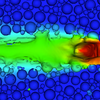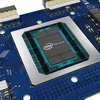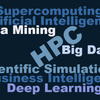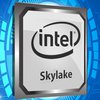Cray and Microsoft have announced a new HPC cloud solution that brings dedicated supercomputers into Azure datacenters.
OK, this story isnt about sports cars, or racing cars, or cars at all. But it is about an engine that has achieved remarkable success in the last three years. Lenovo has quietly roared to the #2 position on the TOP500 with 92 supercomputers on the June 2017 list, up from zero in 2014.
Episode 196: Addison Snell and Michael Feldman discuss Fujitsu's big AI win; plus Intel's Quantum Computing move.
Googles DeepMind team has reinvented AlphaGo, and this latest iteration was able to resoundingly beat the previous version that defeated Go champ Lee Sedol in 2016, by a score of 100 to 0.
Sam Mahalingam, Chief Technical Officer at Altair, thinks much of the value of exascale computing will be provided by machine learning and other data-driven techniques.
In an editorial posted on Intels news site, Intel CEO Brian Krzanich announced they would be releasing the companys first AI processor before the end of 2017. The new chip, formally codenamed Lake Crest, will be officially known as the Nervana Neural Network Processor, or NNP, for short.
Over the last several years, the realm of high performance computing has grown appreciably beyond its roots in scientific simulations. Today it encompasses a lot more data analytics, including emerging areas like artificial intelligence, as well as more established applications like business intelligence. But, if youre an HPC market research company like Hyperion Research, tracking the high-end analytics space is no easy task.
Firemap, a predictive modeling and mapping tool developed to track wildfires, is being used by California residents and first responders to help them deal with the deadliest wildfires in the states history.
Google has announced it is scaling up its cloud computing offerings with a new machine type that provides up to 96 virtual CPUs (cores) and 624 GB of memory.
Episode 195: Addison Snell and Michael Feldman discuss the DOE's change of course on U.S. exascale plans, plus Oracle's GPU Cloud announcement.








